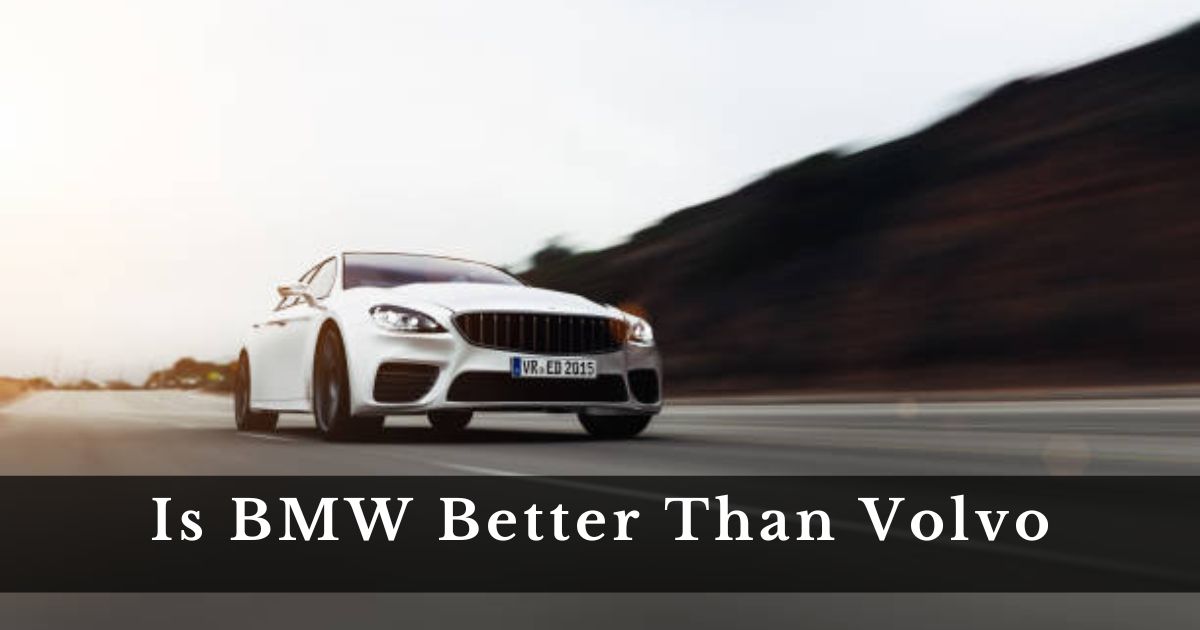Is BMW better than volvo, When it comes to choosing a luxury car, BMW and Volvo are often at the top of the list. Both brands have a strong reputation for quality, safety, and performance. But which one is better? Let’s compare BMW and Volvo across several key areas to help you decide which brand might be the fit for you.
Performance and Driving Experience
BMW is known for its sporty driving dynamics. The brand’s slogan, “The Ultimate Driving Machine,” emphasizes its focus on performance. BMW cars typically offer powerful engines, precise handling, and a thrilling driving experience. Whether you choose a sedan, SUV, or sports car, BMW vehicles are designed to provide a dynamic and engaging ride.
Volvo, on the other hand, prioritizes comfort and safety. While Volvo cars also offer good performance, their strength lies in providing a smooth and relaxing driving experience. Volvos are engineered with advanced safety features and a focus on driver and passenger comfort, making them ideal for long journeys and everyday commuting.
Safety
Safety is a crucial factor for many car buyers, and here Volvo shines. Volvo has a long-standing reputation for building some of the safest cars on the road. The brand has been a leader in automotive safety innovation, introducing features like the three-point seatbelt, which has saved countless lives since its invention in 1959.
BMW also offers excellent safety features and consistently receives high safety ratings. However, Volvo’s dedication to safety is unmatched. If safety is your top priority, Volvo is often considered the better choice.
Design and Interior
BMW designs are characterized by their sporty and aggressive looks. BMW interiors are typically luxurious and driver-focused, with high-quality materials and advanced technology. The layout often emphasizes a connection with the driving experience, featuring intuitive controls and a cockpit-like feel.
Volvo interiors are known for their minimalist and elegant Scandinavian design. Volvo uses premium materials and focuses on creating a calming and sophisticated atmosphere inside the car. The clean lines and functional design make Volvo cabins some of the most comfortable and aesthetically pleasing in the industry.
What Defines Car Quality?
Before diving into the specific car brands, it’s important to understand what we mean by “quality.” High-quality cars typically exhibit the following characteristics:
Reliability: How often the car needs repairs and maintenance.
Safety: The car’s performance in crash tests and the safety features it offers.
Durability: How well the car holds up over time.
Performance: How the car handles and performs on the road.
Customer Satisfaction: Reviews and feedback from car owners.
| Feature | BMW | Volvo |
| Brand Focus | Performance & Handling |
Safety & Technology
|
| Model Range | Sedans, SUVs, Coupes |
Sedans, SUVs, Wagons
|
| Starting Price (USD) | ~$35,000 | ~$40,000 |
| Quality | Excellent | Excellent |
| Pros | Thrilling driving experience, Excellent handling, Stylish design |
Top-notch safety features, Comfortable ride, Strong build quality
|
| Cons | Higher maintenance costs, Can be less fuel-efficient, Firmer ride |
Potentially less engaging driving experience
|
Top Car Brands Known for Quality
Toyota
Toyota is often at the top of the list when it comes to car quality. Known for their reliability, Toyota vehicles consistently receive high marks in consumer reports. Models like the Toyota Camry and Toyota Corolla are celebrated for their long-lasting durability and minimal maintenance needs.
Key Highlights:
Excellent reliability and longevity.
High safety ratings across various models.
Strong resale value.
Honda
Honda is another brand that frequently ranks high in terms of quality. With a reputation for building reliable and fuel-efficient cars, Honda has a loyal customer base. Popular models like the Honda Accord and Honda Civic are well-regarded for their performance and safety features.
Key Highlights:
Renowned for fuel efficiency and reliability.
High customer satisfaction rates.
Advanced safety and driver-assist features.
Lexus
As Toyota’s luxury division, Lexus takes the reliability of its parent brand and adds a layer of luxury and advanced technology. Lexus cars are known for their quiet, comfortable ride and top-tier interior materials. The brand consistently ranks high in customer satisfaction surveys.
Key Highlights:
Combines reliability with luxury.
Excellent customer service and satisfaction.
Advanced safety and infotainment systems.
Subaru
Subaru has built a reputation for making durable, all-weather vehicles. Known for their all-wheel-drive systems and rugged performance, Subaru models like the Outback and Forester are favorites among those who live in areas with harsh weather conditions. Subaru also emphasizes safety, with many models earning top safety ratings.
Key Highlights:
Standard all-wheel drive on most models.
High safety ratings and robust build quality.
Strong performance in all weather conditions.
Mazda
Mazda might not be as large as some of the other brands on this list, but it punches above its weight in terms of quality. Mazda cars are known for their sporty performance and stylish design. The Mazda3 and Mazda CX-5 are popular models that showcase the brand’s commitment to quality and driving pleasure.
Key Highlights:
Stylish design and sporty performance.
High reliability and safety ratings.
Excellent driving dynamics.
Emerging Quality Contenders
Hyundai
Hyundai has made significant strides in recent years, transforming from a budget-friendly option to a brand recognized for quality and reliability. Models like the Hyundai Sonata and Hyundai Tucson are well-built, reliable, and come with a generous warranty.
Key Highlights:
Excellent value for money.
High reliability and comprehensive warranty.
Improved design and performance.
Kia
Kia, like Hyundai, has significantly improved its reputation over the past decade. Known for stylish designs and value-packed offerings, Kia models such as the Kia Optima and Kia Sportage are well-regarded for their quality and features.
Key Highlights:
Stylish and feature-rich vehicles.
Strong warranty coverage.
Improved reliability and customer satisfaction.
How to Choose the Quality Car for You
While these brands are known for their overall quality, thecar for you will depend on your specific needs and preferences. Here are some tips to help you make an informed decision:
Determine Your Priorities: Consider what aspects of quality are most important to you. Is it reliability, safety, performance, or something else?
Read Reviews and Ratings: Look for reviews and ratings from trusted sources like Consumer Reports, J.D. Power, and automotive magazines. These can provide insights into the experiences of other car owners.
Consider Resale Value: Some brands and models hold their value better than others. This can be important if you plan to sell or trade-in your car in the future.
Test Drive Multiple Models: Don’t rely solely on research; get behind the wheel and see how the car feels. A test drive can reveal a lot about a car’s quality.
Check Warranty and Service Options: A good warranty can provide peace of mind. Also, consider the availability and reputation of the brand’s service centers.
Choosing a car brand known for quality can lead to a more satisfying and trouble- ownership experience. Brands like Toyota, Honda, Lexus, Subaru, and Mazda consistently rank high in terms of reliability, safety, and customer satisfaction. Meanwhile, emerging contenders like Hyundai and Kia offer great value and quality. By considering your specific needs and doing thorough research, you can find a car that not only meets but exceeds your expectations in terms of quality.





